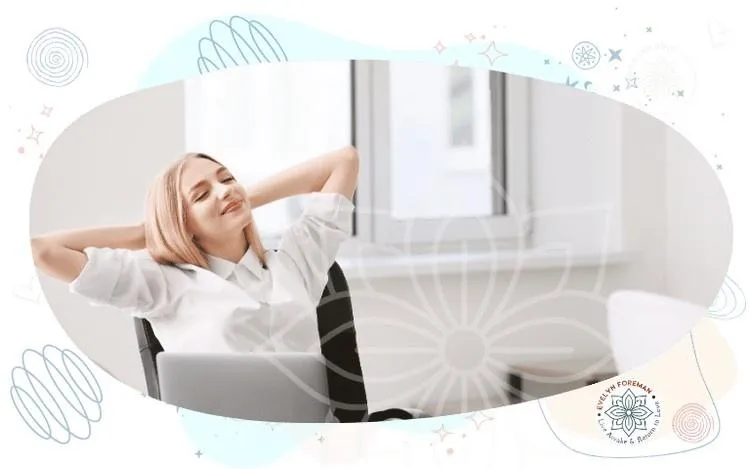
Find Inner Peace & Purpose with Mindful Living Practices
A Sacred Guide for Healers, Lightworkers, and Soul-Led Leaders
In these times of global transformation, many sensitive souls, empaths, healers, and awakened beings feel the weight of the world. The urgency to rise, to serve, to heal… It's real. But too often, that sacred call comes tangled in burnout, anxiety, and the illusion that we must do more to be enough.
What if the path forward is less about striving and more about remembering?
Mindful living is not just about reducing stress; it's a return to your center. It’s how you reclaim sovereignty in a noisy world. It helps you drop into your body, quiet the ego, and realign with your highest frequency. As you cultivate inner peace, you become a clearer vessel for your purpose and a stabilizing light for others.
In this post, you’ll discover 12 soul-nourishing practices that support mindful, grounded, and purposeful living, designed specifically for those walking the awakened path.
What Is Inner Peace (and Why It Matters for Healers)?

Inner peace is not about bypassing the hard stuff. It’s about anchoring into a calm, sovereign energy within, even when the outer world feels chaotic.
For lightworkers and energy practitioners, inner peace is the energetic soil where your gifts flourish. It's the still point that allows divine guidance to land. When you live from this space, your work becomes more powerful, your relationships deepen, and your nervous system finally exhales.
What Is Equanimity?
Equanimity is sacred neutrality. It’s the spacious awareness that allows you to witness, feel, and respond, without being swept away.
This state of being is especially vital for those holding energetic space for others. Mindfulness cultivates this inner steadiness so you don’t absorb others’ energy, but instead transmute it with grace.
“Between stimulus and response, there is a space. In that space is our power to choose.”
, Viktor Frankl
12 Mindful Living Practices for Peace, Purpose & Spiritual Sovereignty
These daily practices are invitations to return home to yourself, to reconnect with your essence, your Source, and your sacred mission.
1. Meditate to Remember Who You Are
Meditation isn’t about escape; it’s about reconnection. Just a few minutes of presence each day can open the channel to your soul’s wisdom.
Tip: Start with 5 minutes of breath awareness or a guided meditation. Use this time to clear your field and anchor your energy before serving others.
✨ Want deeper clarity on your soul-money connection?
Download the Money Mindset Breakthrough Kit, a powerful tool to help heal scarcity patterns and align your gifts with prosperity.
2. Live in the Present Moment
Presence is your superpower. When you're attuned to the now, you become a clear conduit for intuitive guidance and divine flow.
Practice: Place your hand on your heart and ask, “What’s real right now?” Let this question bring you out of the mind and into the body.
3. Cultivate a Positive Energy Field
Your thoughts create frequency. By choosing more loving, empowering beliefs, you shift your vibrational baseline.
Try this: Shift “I have to” into “I get to”, and notice how your energy changes.
Reflection: What frequency are you radiating today?
4. Practice Sacred Self-Love

True self-love is a revolutionary act. As a healer, your relationship with yourself sets the tone for every other interaction.
Prompt: What is one soul quality I embody today? Speak it aloud with reverence.
Ready to come home to your truth? Explore The Quantum Path to Coming Home™, a transformational journey to reclaim your wholeness and inner belonging.
5. Embrace Mindful Self-Care
Your vessel is sacred. Tending to your body and energy isn’t optional; it’s a spiritual responsibility.
Try this: Ask yourself, “What would you love to choose for me right now?” Follow the answer without guilt.
6. Visualize a Sanctuary of Peace
Your inner landscape shapes your reality. Visualization helps you recalibrate and anchor to higher timelines.
Exercise: Close your eyes. Breathe into your heart. Imagine a sacred sanctuary where your soul feels safe, whole, and luminous.
7. Breathe Like a Priestess
Conscious breath is an ancient portal. It grounds scattered energy and expands your capacity to hold space for yourself and others.
Try this: Inhale for 4… hold for 4… exhale for 6. Repeat until your nervous system softens.
8. Commune with Nature’s Wisdom
Nature is your original temple. Trees, rivers, stones, they mirror your cycles and wisdom.
Tip: Visit a natural place often. Don’t just walk, listen. Let the Earth speak to you.
9. Practice the Frequency of Gratitude
Gratitude is not about pretending everything’s okay. It’s about finding beauty even amid mystery.
Reflection: What is one thing today that moved your heart? Write it. Feel it. Offer thanks.
10. Surrender with Grace

True power arises from surrender, not control. Acceptance creates energetic spaciousness for miracles to unfold.
Affirmation: “I allow, I trust, I align.”
11. Release Judgment, Return to Compassion
Judgment contracts. Compassion expands. As lightworkers, we are called to be fierce in love with ourselves and others.
Practice: When judgment arises, pause. Breathe. Replace it with a question: “What would compassion say?”
12. Weave Soulful Connection
Your presence is healing. Being seen, heard, and met in truth is one of the most powerful gifts you can give.
Mindful tip: In your next conversation, listen with your whole being. Let your presence speak louder than your words.
The Ripple of Peace: Why Your Inner Work Matters
When you embody peace, you shift the frequency of every space you enter. You become calm in the storm. You show others what’s possible when we choose love over fear.
The world doesn’t just need more action; it needs more embodied presence. As you return home to yourself, you anchor peace not only for you, but for the collective.
Calm your mind, realign your energy, and the world around you begins to shift.
Final Reflection
You don’t need to become someone else to live with purpose. You’re already whole, already wise, already worthy.
Let these practices guide you back to your essence, the part of you untouched by fear or doubt.
Take what resonates. Leave what doesn’t. Keep returning home.
✨ You are the light. You are the healer. You are the medicine.
Let your peace be your power.
Because every act of compassion, starting with yourself, ripples outward to heal the world. To continue receiving soulful practices and reflections, you’re invited to join Evelyn on Substack, where each post is a reminder to return home to your light.
[Download your free Compassion & Loving Mindfulness Meditation here →]


